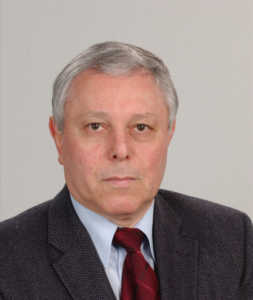György Ágoston
He began his television career at the Szeged Regional Studio in 1976 (his task was to create the technical and technological conditions for the studio's operation).
In 1988, he was appointed Deputy Technical Director of Hungarian Television (MTV) in Budapest and Head of the Development and Investment Department. Under his leadership, the world's first digital studio complex was put into operation on Bojtár Street in 1991, and one of the world's first large digital broadcasting trucks was also built; the first domestic satellite station was established; the basic infrastructure for saving the archive and the film restoration workshop were created; a new teletext system was installed, the mobile micro system and the synchronous studios were renewed, the first optical connections were established between the Parliament and the MTV headquarters; the digitalization of the studios and broadcasting trucks began; the foundations of MTV's IT network, and thus the networked Internet access and the intranet network, were laid. Together with his colleagues, he prepared the program for the complete digitalization and long-term strategic development of MTV.
In 1997, he was appointed Technical Director of MTV. In 2001, he and his colleagues redefined the technological concept of the new television center, which was based on the application of the most modern IT tools and methods in program production and archiving technologies. He participated in the preparation of the implementation of this concept until May 2005. His activity at MTV ended in May 2005.
In October 2005, he joined a newly formed telecommunications company (ACTEL), where he contributed to the preparation of "triple play" services.
In 2006/2007, he participated in the work of the Digital Transition Group as an external employee of the Institute of Applied Communication Sciences (AKTI), operating under the National Radio and Television Board (ORTT).
Back in 2000, the Budapest University of Technology (BME9) Department of Information Technology asked him to start an elective course as a lecturer entitled "Digital Studio Technology".
He has published about 150 articles in domestic and foreign publications and has given lectures at domestic and foreign forums on television, modern television technology and its development. He is co-author of the book "Digital Television Services. Introduction Models, Foreign Experiences" published in 2005.
Between 1989 and 2005, he participated in various roles and levels in the activities of the EBU (European Broadcasting Union) and the International Telecommunication Union (ITU), most recently as Vice-Chairman of the EBU Technical Committee (2000-2005). He was one of the preparers of MTV's EBU membership.
In the ranks of the Hungarian Association of Telecommunications and Informatics (HTE), he was the founding president of the Studio Technology Department (1994-2008); founding vice-president of the so-called DVB-Circle (1997-2008); vice-president of the TMMB-IHSZB (Telecommunications Engineering Qualification Committee, Informatics and Telecommunications Expert Committee) (1999-2004); member of the Management Committee (1996-2002); deputy secretary general (2002-2008); vice-president (2008-2011); co-president of the HTE Television and Sound Technology Conference and Exhibition (1994-2007).
Awards: "For Excellent Work" Award (MTV, 1981); MTV Presidential Award (3 times); Hungarian Republic Gold Cross of Merit (jointly with four colleagues, Hungarian State, 1993); Tivadar Puskás Award (HTE, 2002); HTE Gold Badge (HTE, 2012); Lifetime Achievement Award (HTE, 2023).
Created: 2023.12.18. 23:24
Last modified: 2025.05.16. 13:47

